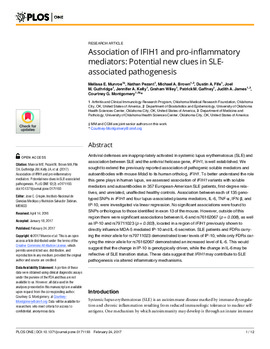| dc.contributor.author | Melissa E. Munroe | |
| dc.contributor.author | Nathan Pezant | |
| dc.contributor.author | Michael A. Brown | |
| dc.contributor.author | Dustin A. Fife | |
| dc.contributor.author | Joel M. Guthridge | |
| dc.contributor.author | Jennifer A. Kelly | |
| dc.contributor.author | Graham Wiley | |
| dc.contributor.author | Patrick M. Gaffney | |
| dc.contributor.author | Judith A. James | |
| dc.contributor.author | Courtney G. Montgomery | |
| dc.date.accessioned | 2017-04-10T23:19:02Z | |
| dc.date.available | 2017-04-10T23:19:02Z | |
| dc.date.issued | 2017-02-24 | |
| dc.identifier.citation | Munroe ME, Pezant N, Brown MA, Fife DA, Guthridge JM, Kelly JA, et al. (2017) Association of IFIH1 and pro-inflammatory mediators: Potential new clues in SLE-associated pathogenesis. PLoS ONE 12(2): e0171193. doi:10.1371/journal.pone.0171193 | en_US |
| dc.identifier.uri | https://hdl.handle.net/11244/50425 | |
| dc.description | This study was supported by the National Institute of Allergy, Immunology and Infectious Diseases, Office of Research on Women’s Health, National Institute of General Medical Sciences, and the National Institute of Arthritis, Musculoskeletal and Skin Diseases under award numbers U01AI101934, R01AI024717, U19AI082714, U54GM104938, P30GM103510, P30GM110766, P30AR053483, RC1AR058554, U34AR067392, and HHSN266200500026C. This publication is the sole responsibility of the authors and does not represent the views of the National Institutes of Health. | en_US |
| dc.description | | en_US |
| dc.description.abstract | Antiviral defenses are inappropriately activated in systemic lupus erythematosus (SLE) and association between SLE and the antiviral helicase gene, IFIH1, is well established. We sought to extend the previously reported association of pathogenic soluble mediators and autoantibodies with mouse Mda5 to its human ortholog, IFIH1. To better understand the role this gene plays in human lupus, we assessed association of IFIH1 variants with soluble mediators and autoantibodies in 357 European-American SLE patients, first-degree relatives, and unrelated, unaffected healthy controls. Association between each of 135 genotyped SNPs in IFIH1 and four lupus-associated plasma mediators, IL-6, TNF-α, IFN-β, and IP-10, were investigated via linear regression. No significant associations were found to SNPs orthologous to those identified in exon 13 of the mouse. However, outside of this region there were significant associations between IL-6 and rs76162067 (p = 0.008), as well as IP-10 and rs79711023 (p = 0.003), located in a region of IFIH1 previously shown to directly influence MDA-5 mediated IP-10 and IL-6 secretion. SLE patients and FDRs carrying the minor allele for rs79711023 demonstrated lower levels of IP-10, while only FDRs carrying the minor allele for rs76162067 demonstrated an increased level of IL-6. This would suggest that the change in IP-10 is genotypically driven, while the change in IL-6 may be reflective of SLE transition status. These data suggest that IFIH1 may contribute to SLE pathogenesis via altered inflammatory mechanisms. | en_US |
| dc.language.iso | en_US | en_US |
| dc.publisher | PLos One | |
| dc.relation.ispartofseries | PLoS ONE 12(2): e0171193 | |
| dc.relation.uri | http://www.plosone.org/article/info%3Adoi%2F10.1371%2Fjournal.pone.0171193 | |
| dc.rights | Attribution 3.0 United States | |
| dc.rights.uri | https://creativecommons.org/licenses/by/3.0/us/ | |
| dc.subject | Systemic lupus erythematosus,Autoantibodies,Human genetics,Exon mapping,Genetics of disease,Inflammatory diseases,Mouse models,Pathogenesis | en_US |
| dc.title | Association of IFIH1 and pro-inflammatory mediators: Potential new clues in SLE-associated pathogenesis | en_US |
| dc.type | Research Article | en_US |
| dc.description.peerreview | Yes | en_US |
| dc.description.peerreviewnotes | http://www.plosone.org/static/editorial#peer | en_US |
| dc.identifier.doi | 10.1371/journal.pone.0171193 | en_US |
| dc.rights.requestable | false | en_US |

